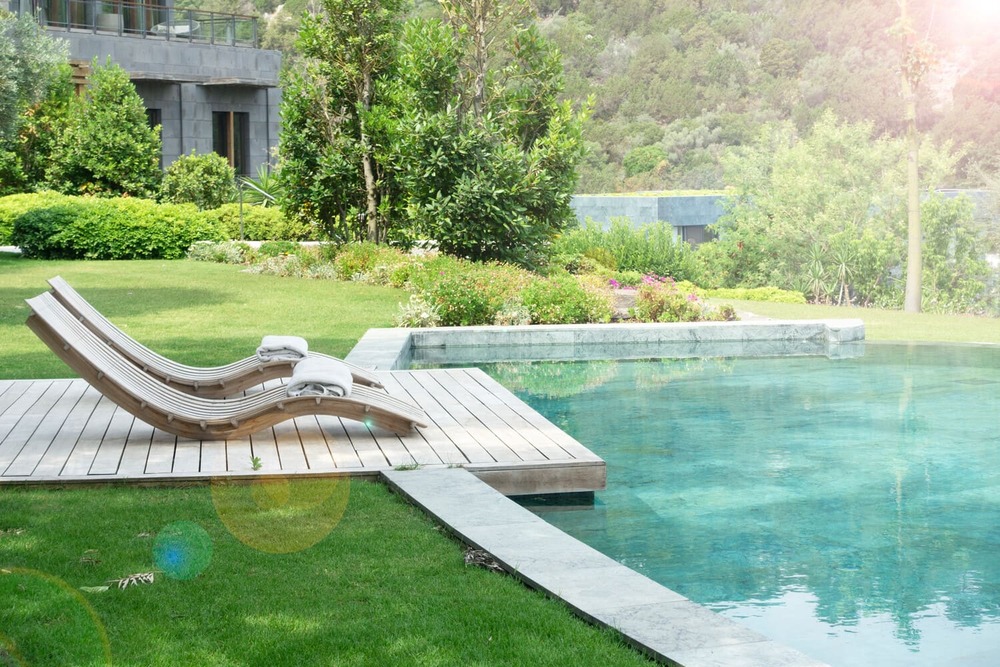In recent years, there has been a marked surge in environmental awareness and concern for sustainability. As a result, the pool industry has responded by adapting its offerings to align with this trend. One such offering is the eco pool.
An eco pool can go by various names such as a sustainable pool, green pool, eco-friendly pool, and bio pool, to name just a few. In essence, an eco pool operates with minimal resources while still providing a perfect pool and wellness experience for its users.
Eco pools use environmentally responsible mechanical systems and treatments that reduce water consumption, minimise the use of chemicals, and decrease energy consumption. This is why eco pools are currently a hot trend, as owners and operators seek to lessen their impact on the environment while still enjoying all the benefits of an upscale swim experience.
Dive deeper with the eBook
Sustainable solutions from the outset
Sustainability should be at the core of an eco pool project from the very first moment. Efficiency and sustainability can be achieved through construction systems that incorporate reused materials and manufacturing processes with low environmental impact. This approach leads to long-term operational savings through less maintenance.
For small commercial or residential pool projects, recycled building solutions such as container swimming pools offer an all-in-one solution. This approach involves transforming a rectangular shipping container, like those used for logistics on ships and large trucks, into a functional swimming pool.
Stainless steel is another highly sustainable material option for eco pool construction due to its reusability and recyclability, significantly reducing environmental impact. Stainless steel pools are highly durable and require minimal maintenance. Moreover, the hygienic properties of stainless steel pools, combined with effective sealing techniques, ensure long-lasting clean water, which contributes to reducing the use of chemicals.
Prefabricated modular panel systems, like Skypool, also reduce the energy expended on manufacture, logistics and costly concrete pouring processes. These solutions have been in use for some time and have proven to be highly efficient and sustainable for a range of pool types.

Efficient pool equipment for a more sustainable pool
Once the pool basin is built, minimising water and energy consumption should be the next priority for facility operators with eco pool ambitions. There are various ways to make a pool more efficient and sustainable, including LED lighting, filtration and recirculation technologies, water treatment and disinfection systems, heating and cooling solutions and pool covers.
LED lighting
One of the sustainable technologies used in modern pools is LED lighting. LED lighting offers a lighting solution that is energy-efficient and cost-effective, with a lifespan of up to 20 times longer than halogen lighting. This technology can reduce energy consumption by up to 97% compared to halogens.
Filtration and recirculation
Another key component of an eco pool is efficient filtration and recirculation technologies. Variable speed pumps for water recirculation, for example, can save up to 65% on electricity by working according to the pool’s real time needs.
High-efficiency filters that use sand or glass as filtration media also provide greater efficiency and savings, as they reduce the need to use chemicals for disinfection. Also, they require fewer maintenance and backwashing needs, thus providing water and energy savings.The water used for backwashing these filters can be also treated and reused for other cleaning purposes. Additionally, regenerative filters with perlite filter media regenerate the media by only using vibration, thus providing water, energy, and chemical savings.
Water treatment
Eco-friendly water disinfection methods include salt chlorinators, which do not require the storage of toxic products, and ultraviolet radiation, which directly affects the DNA of microorganisms to suspend their development. These methods can reduce chemical consumption by 80-90%.
Combining these technologies has led to innovative methods such as Neolysis, which combines salt electrolysis with ultraviolet radiation for efficient and sustainable water treatment. Freepool2 also combines these methods and has an in-water CO2 injection system that corrects pH levels and reduces water consumption by 66%.
Heat pumps
Heat pumps are an economical solution to heat pool water and extend the swimming season. Inverter heat pumps can adjust its running operation to the pool settings to offer optimal performance and generate energy savings.
These latest innovations based on aerothermia harness the air’s thermal energy to heat the pool even in cold temperatures, with up to 80% of the energy used for heating coming from the air. So, they use a renewable source of energy. The inverter technology also allows to reverse this process, removing heat from your pool and expelling it outside, effectively cooling your aquatic facility in extreme hot summer days.
Combining heat pumps with solar panels can enhance facility efficiency. Additionally, geothermal energy can also be used to heat swimming pools by taking advantage of the thermal energy in the subsoil.
Pool covers
Pool covers are also an effective eco pool solution to prevent heat loss from the water and keep it warm and clean while the facility is not in use. They offer efficient temperature control, reduce water evaporation, and lower energy and chemical costs, resulting in hygienic water and reduced maintenance work.
The next generation of sustainable swimming pool solutions
The integration of the Internet of Things (IoT) into the pool industry has revolutionised the way operators control pool and wellness facilities, while promoting sustainability and environmental responsibility. IoT allows for automatic adjustment and programming of pool operations and parameters, leading to a reduction in costs, water and energy consumption, as well as an improved facility and equipment life cycles.
With accurate and diagnosable data, control and maintenance processes can be precisely fine-tuned to the real needs of the pool, resulting in greater efficiency and reduced costs. One such example of IoT integration is Fluidra Connect, an application that transforms any aquatic facility into a smart pool. Compatible with various products and solutions, this application automates essential processes such as water recirculation and disinfection, ensuring that the pool is always in optimal condition.

Bio pools: the ultimate eco pool rooted in nature
Swimming ponds and bio pools are gaining popularity as the ultimate eco pool solution thanks to their natural, chemical-free water treatment process. They are an ideal choice for those who want to create an aquatic facility that is in harmony with its natural surroundings. Naturalized pools and swimming ponds use state-of-the-art technology to maintain the perfect ecosystem, which keeps the water clean and clear all year round.
Unlike traditional pools, the water in ponds and bio pools is treated by plants, mechanical filters, phosphates and other biological elements in the water. This process is completely free of chemicals, which makes the ponds and bio pools an eco-friendly option for pool owners. By eliminating the need for chlorine and dilute acid, they have a rather low environmental impact.
One of the great benefits of natural pools and swimming ponds is that they offer an immersive, natural experience that is closer to nature than a traditional pool. They can be incorporated into both indoor and outdoor gardens and green spaces, and they provide a perfect opportunity to add an ornamental touch to the surrounding landscape. Furthermore, they can be equipped with various water features, such as a small waterfall or a spring fountain, to enhance their beauty and create a more luxurious swimming experience.
It’s important to note that regulations for these types of pools may vary from country to country, so it’s essential to consult with local authorities to ensure that your pond or bio pool meets the necessary requirements. In addition, choosing the right pond filter media for your facility is also important for ensuring the quality of the water.
A more sustainable swim is within arm’s reach
The eco pool has emerged as a popular and viable option for those seeking sustainable and environmentally responsible swimming pool solutions. From the use of sustainable building materials and efficient water treatment systems to the integration of IoT solutions, eco pools provide a perfect pool experience while minimising resource consumption and reducing environmental impact.
Eco pools offer an excellent opportunity for individuals and organisations to reduce their carbon footprint and promote sustainability. By implementing sustainable practices and technologies from the outset, an eco pool can deliver long-term cost savings, minimal maintenance and optimal water quality. With these technologies, we can all take steps to protect the environment while still enjoying the benefits of comfortable aquatic facilities.
